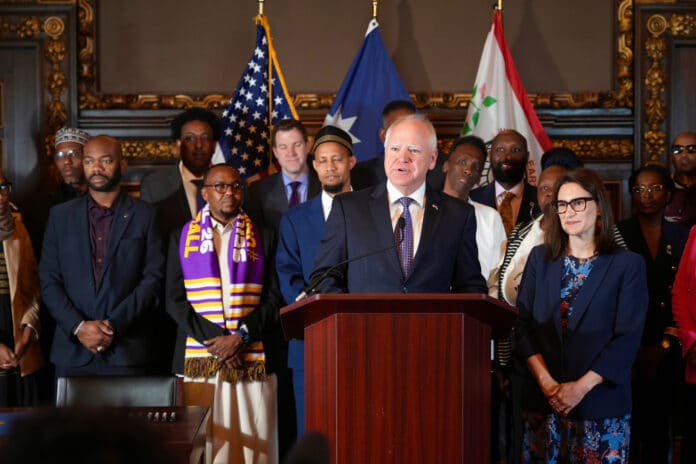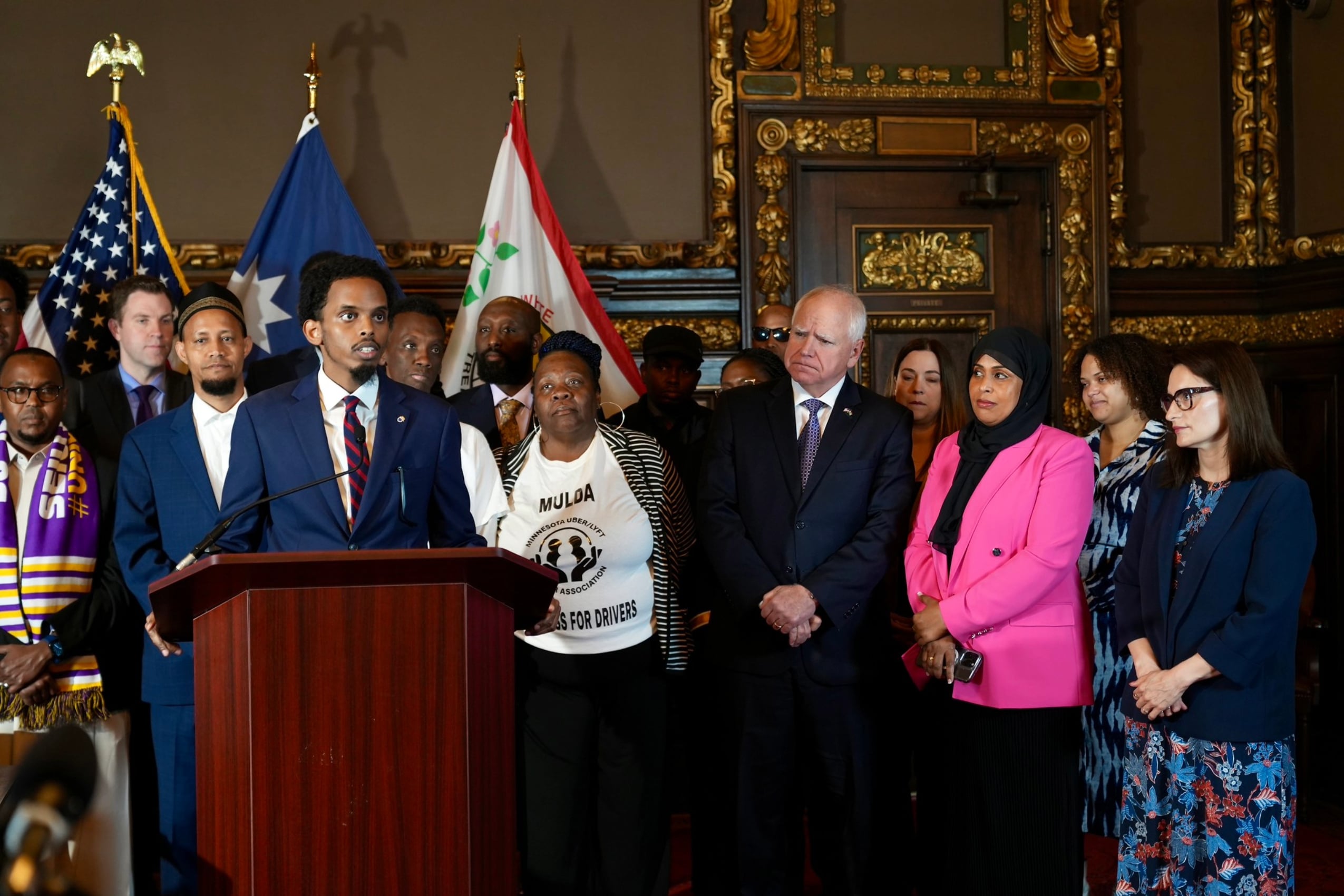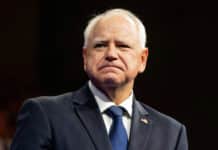
Gov. Tim Walz thinks Minnesotans who use Uber and Lyft are ready and willing to accept an anticipated hike in fares knowing that it means those rideshare drivers will see a bump in their income — the result of a bill he signed into law last week.
On Tuesday, Walz held a signing ceremony at the Capitol to recognize an eleventh-hour deal that DFL lawmakers struck during the last weekend of the legislative session, which will keep Uber and Lyft in Minnesota while putting into law increased earnings and protections for rideshare drivers.
“I think a lot of people don’t want to take a ride knowing that the person that’s driving them can’t afford to pay their bills or their children can’t eat,” Walz told reporters when asked whether he thinks riders will be able to stomach an up to 20 percent increase in their Uber and Lyft fares. “That’s not what people want to do. They want fairness in this.”
Walz’s comments came almost exactly one year after he vetoed a similar bill. Following that veto, a number of rideshare drivers held protests outside the governor’s office at the Capitol. But Walz explained his support for the new bill as seeking a balance between corporate interests for profit and worker demands for fair earnings.
“No one is saying that corporations shouldn’t be able to make money,” Walz continued, as he pushed back on assertions that riders may not be pleased with an increase in rideshare fares.
“But we have seen this in this country where it used to be CEOs of these companies made 50 times more than their employees, now they are making 5,000 times more than their employees,” Walz continued. “I think what this group asked for is ‘How about some more fairness.’ And so we will see, we’ll see how the pricing model goes.”
Numbers at a glance
Both Uber and Lyft had warned the Twin Cities community multiple times over the last year that they would cease operations in the market if an ordinance the Minneapolis City Council passed that was set to raise driver wages by $1.40 per mile and 51 cents per minute took effect.
Earlier this session Republicans in the House introduced a preemption solution that DFLers ignored as they took on other signature legislation — such as an ERA bill, a ban on book bans and new gun restrictions.
Democrats never gave a hearing to the bill authored by Rep. Elliott Engen, R-White Bear Township, that would have preempted local rideshare regulations. However, the bill Democrats passed in the final hours of session does include preemption language that prevents local governments from regulating rideshare companies.

That compromise deal among DFL legislative leaders, Walz and stakeholders was reached on Saturday of the final weekend of session. Among those in the room were a select number of rideshare drivers who have formed the Minnesota Uber Lyft Drivers Association.
The provision, now signed into law, requires that companies pay rideshare drivers $1.28 per mile and 31 cents per minute with a $5 minimum per ride. That’s compared to the bill Walz vetoed last year that would have established a $1.45 per mile and 34 cent per minute minimum. The law, which goes into effect on Dec. 1, also builds in an automatic increase as indexed to inflation each year, beginning January 2027. It also provides a process for protection of drivers from deactivation.
The assumption that most, if not all, Uber and Lyft drivers are struggling to make ends meet and work the job full time has been challenged by critics who say many rideshare drivers consider themselves gig workers.
“Maybe for many people this is gig work,” said Eid Ali, president of the Minnesota Uber Lyft Drivers Association that was involved in several behind-the-curtain discussions with key DFL lawmakers on the bill. “But there is a community (of drivers) that I am a member of that depends on this as their livelihood and it’s a 100 percent full-time job for them.”
Last year Walz vetoed a bill passed by Democrats in the House and Senate that would have established minimum pay standards for rideshare drivers, after the rideshare tech titans threatened to leave the state. Following blowback from some of his fellow Democrats, the governor then set up a task force of various “stakeholders” to find a solution to the demands that some rideshare drivers — including those who belong to MULDA — had successfully lobbied at the state and local levels.
Republicans expressed frustrations in the waning hours of session earlier this month on how the deal was done.
The GOP’s preemption bill “would have taken care of the issue,” House Minority Leader Lisa Demuth said during debate over the bill during the last hours of the legislative session on May 19. “We could have solved this issue two months ago. The other reason we are here is what was at risk — the Minneapolis City Council was at risk of cancelling 400,000 rides per week and they had at risk $400,000 per day of earnings.”
Hank Long
Hank Long is a journalism and communications professional whose writing career includes coverage of the Minnesota legislature, city and county governments and the commercial real estate industry. Hank received his undergraduate degree at the University of Minnesota, where he studied journalism, and his law degree at the University of St. Thomas. The Minnesota native lives in the Twin Cities with his wife and four children. His dream is to be around when the Vikings win the Super Bowl.















